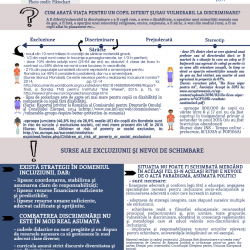
A year ago I started working on an almost impossible research, trying to find out how LGBT students live and learn in Romanian highschools. Many educational professionals told us that such students simply don’t exist;
our youth are definitely heterosexuals, except maybe for those who are not sufficiently mature yet or who are confused or have mental problems and they might declare themselves LGBT… There are no LGBT students, only students with special educational needs.
Our research showed not only that such students exist in every school (another research identified that between 4% and 12% of the students had a same sex sexual experience ), that they are talented and very “normal” youth, but also that being LGBT in high school means having to deal with a great amount of violence..
If you are LGBT and a high school student, it is very likely to hear your colleagues saying you shouldn’t exist (or even that it would be better or desirable to be even killed) or that you are a pervert (a possible pedophile) and surely meant to go to Hell or suffer from all divine punishments.
In your school, it is also very likely to have colleagues who will mock you, call you nicknames or insults only because they think you might be LGBT. And they will definitely mock your friends too, because they have the courage to accept you for who you are (almost a third of our respondents said they had witnessed such cases).
| Chances are that in 8% of case an LGBT youth will be physically abused in schools –punched, stolen goods, pushed around or filmed with a mobile phone, despite your lack of consent. |
For many of the non-heterosexual high school students it is a real challenge to find their way through the school yard or to explain to their colleagues why they don’t have a boyfriend/ girlfriend. Sometimes the violence and the interdiction to speak openly about who you really are (if they know for sure you are gay, then the school might explode) lead to isolation and even depression, especially when there is no family support or understanding.
Life during classes doesn’t get any simpler as long as homophobic jokes and remarks are of common use: “sometimes teachers joke about the LGBT, with the attitude that it’s only a joke, it is not real, and these types of people don’t actually exist”.
The topic of human sexuality is approached with scientific superficiality (most often discussed during biology and religion classes) and the very few pieces of information are presented to students in an awkward, clumsy way and always within the framework of a mother+father+child family, although almost a quarter of children in Romania no longer come from this kind of traditional family.
The traditional schooling curricula and school classes lack any references to sexual orientation. Students never learn about the contribution of LGBT authors to human knowledge– thus missing out on a beneficial learning opportunity for students and teachers, as well.
Unfortunately not even the schools’ mental health specialists seem to offer more support to students, as they are themselves prisoners of misunderstanding and lack adequate professional training and unbiased information:
“Recently I have found out that the school’s psychologist and other sociology/ psychology teachers say that non-heterosexuals are deviants and it is impossible for them to understand such sexual deviants.”
The impossible mission that we need to take on as specialists in the field of education, as parents or mere citizens is to have the courage to overcome our fear and embarrassment and to admit that LGBT students are in every one of the schools in Romania.
We ourselves have got to learn what sexual identity is and what homophobia is and what it does to people. Most likely we will have to censor homophobic remarks in us and in others, as well as violent behavior and language.
Equally important is to discover information and create educational contents that would show the contribution of LGBT authors to knowledge.
A safe high-school is, first of all, a high-school free of violence, including free of homophobia motivated violence.
Irina Costache
Irina Costache has a PHD in Gender Studies at the Central European University (CEU). Since 2012, Irina has been working in the field of preventing gender violence in all its aspects. She coordinated advocacy and educational projects on sexual violence/ violence against women. In 2015, Irina Costache collaborated with ACCEPT Association in carrying out a research regarding attitudes and perceptions of high school students towards sexual minorities.








